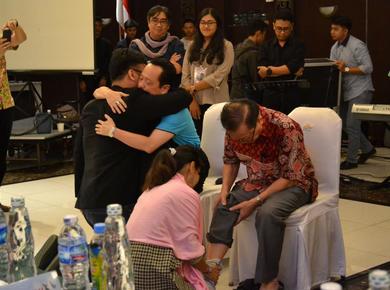Posted: January 9, 2018
Like the chambers of a heart, the four MWC commissions serve the global community of Anabaptist-related churches, in the areas of deacons, faith and life, peace, mission. Commissions prepare materials for consideration by the General Council, give guidance and propose resources to member churches, and facilitate MWC-related networks or fellowships working together on matters of common interest and focus. In the following, one of the commissions shares a message from their ministry focus.
Where do you look when you ask yourself what a deacon’s task is? Very often, one turns to Acts 6:1–6, although the word “deacon” or “servant” (diakonos) does not appear in this text. In this passage, the community provides for those who are needy among them, and as the church grows, the needs grow as well. The community appoints men to organize the daily distribution of food. These men – deacons – listen to the needs and meet them with the means shared by the community.
Is this the essence of a deacon’s work?
In this passage, I stumble over two points that influence our perceptions of the work of a deacon.
First, there is the Apostles’ reasoning: “It is not right that we should neglect the word of God in order to wait on tables” (Acts 6:2).
Do I hear here an underlying assumption that preaching is more important than looking after physical needs? The passage seems to support dualistic attitudes that separate humanitarian service from preaching the gospel. Such a split may hinder us from seeing the spiritual aspects in deacon’s work. It is serving the Word as much as prayer and preaching, or in fact is prayer and preaching.
Secondly, in Acts, the task of a deacon is defined by the obvious needs in the community.
It seems that the deacons’ task is only fulfilled when the needs are satisfied. It is certainly very important that deacons hear the cries of the needy and look for ways that answer. But very often, when I listen to deacons in local communities, I sense that they are overwhelmed by the expectations and feel that they are falling short of what is expected from them.
When we share experiences in our commission, some speak about these unmet expectations. The needs in the worldwide church are endless. It is difficult to choose. How can you know what is most urgent?
But there are also other voices: When members of the deacon’s commission went to stand by those in need, they are often enriched also. The community presents them with unexpected gifts. Something happens that breaks this hierarchy of a giver and those who receive.
So again: Where do we look for orientation for a deacon?
For our commission, that Jesus washing the feet of his disciples (John 13:1–20) provides a more comprehensive image of a deacon.
Jesus does the work of a house-slave. These servants are easily overlooked because they usually are not among the main characters who carry the plot. Jesus does not deny that he is Lord and Teacher, but he is Lord and Teacher as the house-slave. He serves the needs of the disciples as guests in his Father’s house. He is identified with what God’s house stands for.
Jesus models what needs to be done to the guests, and not what the guests think their needs are. As Jesus washes them their feet, they both participate in that deepest movement that defines this “house of God”: Jesus loves them to the end (John 13:1).
To be a deacon, then, is a role for every minister who serves the Word. You cannot really preach the gospel if you are not a deacon. You cannot serve the church with truth, you cannot work for reconciliation, peace and justice without being a deacon.
So yes, a deacon’s task is to stand by the needy in the community, knowing that we need them probably even more than they need what we can bring. In this, we both participate in the life in the Father’s house.
As we reflected on this passage, our commission became aware of the difficulty of hearing the voices of those who do not voice their needs. How can we make sure that our awareness is not shaped by those who cry the loudest or by what the media portrays as the most urgent? How can we see those who are too easily overlooked?
We most certainly depend on God’s Spirit to overcome our blindness.
—a Mennonite World Conference Release by Jürg Bräker, a member of the Deacons Commission. He is general secretary of the Konferenz der Mennoniten der Schweiz (Alttäufer), Conférence mennonite suisse (Anabaptiste).



Comments: